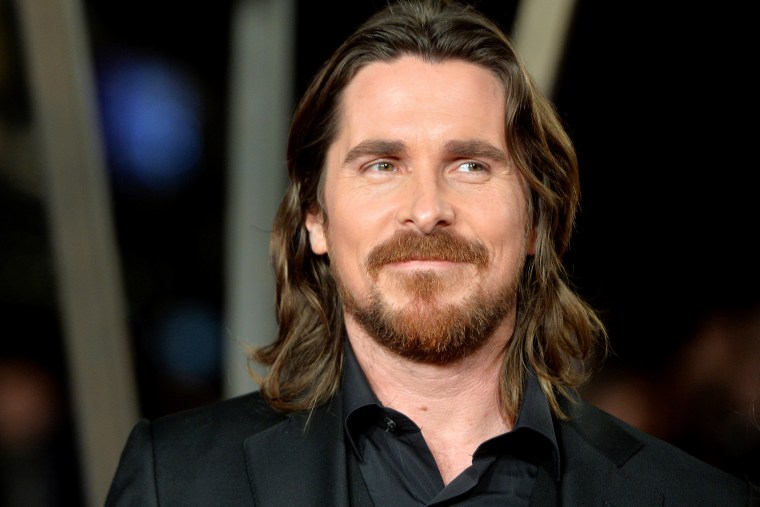Actor Christian Bale has played a brooding Batman, an American psycho, a Terminator killer, and a host of other roles to high acclaim. But he's garnered plenty of attention for the role he plays in his latest film, Ridley Scott's Exodus: Gods and Kings, before the movie is even released in theaters.
The attention Bale is getting, however, is largely due to his comments about his character, the biblical hero Moses who - according to the Old Testament - led the Israelites out of Egypt and parted the Red Sea freeing them from slavery.
It began with an international press event in Los Angeles in September when Bale said, "I think the man was likely schizophrenic and was one of the most barbaric individuals that I ever read about in my life," according to The Hollywood Reporter.
Related: Chris Rock is on a political roll
Bale also said, "He was a very troubled, tumultuous man and mercurial."
Then, just before Thanksgiving, an ABC News interview aired in which the actor said Moses was "absolutely seen as a freedom fighter for the Hebrews, but a terrorist in terms of the Egyptian empire.” Bale then rhetorically asked, “What would happen to Moses if he arrived today? Drones would be sent out after him, right?”
Bale’s previous remarks had already received criticism -- Senior Lecturer Mary Murphy from the Univ. of California's Annenburg School, for example, sarcastically asked, "Where did Christian Bale get his Ph.D. in religious studies?" -- but his comparison of Moses to a “terrorist” escalated the backlash. FOX News did a segment on its morning show critical of Bale’s remarks. The conservative media watchdog site NewsBusters said Bale should “please just shut up and act.” Criticism of Bale’s comments also caught the attention of sites like Christian Today and The Christian Times.
Many religious scholars, however, are much more measured in their reactions to Bale's comments. "Mr. Bale is right in reminding us of Moses's humanity, something we often forget about many figures from the Bible," Jesuit priest Rev. James Martin told msnbc. Martin, who is also an editor-at-large for America: The National Catholic Review, said Moses "was also indeed 'tumultuous' and 'troubled' as any person would be after such a dramatic encounter with the Living God."
Rev. Martin also agreed with Bale that Moses was a "freedom fighter" but said he would stop short of calling him a "terrorist," before adding, "I prefer liberator."
Everett Fox, a professor of Judaic and Biblical Studies at Clark University who has personally translated the Old Testament books about Moses (collectively known as the Torah) into English, told msnbc that Bale "reduces [Moses] to set of categories that don’t fit the biblical story." Professor Fox continued, "The Bible chooses to recall him as a reluctant prophet who speaks truth to power, a man of possibly conflicted identity who comes to realize his calling as a messenger of God."
Fox, who is also the author of The Five Books of Moses, said beyond that "everything is speculation" and was critical of Bale for calling Moses's mental state into question. "Bale needs to dig deeper into the text," Fox said. "Moses is not Bruce Wayne (or Batman)."
Marc Brettler, professor of Biblical Studies at Brandeis University told msnbc he approaches Moses "very differently." Professor Brettler says he does not consider the biblical story of Moses to be biographical, instead noting that the accounts of Moses within the Torah "differed and sometimes even contradicted each other."
Brettler likened those accounts to a hypothetical book collecting both Southern and Northern historical accounts of Abraham Lincoln into one volume. The results, he argues, "would emerge as contradictory or even schizophrenic."
"...[Moses] is indeed not a good role model, and that’s putting it mildly."'
Richard Dawkins, author of The God Delusion, is much more critical of Moses - but first pivoted to a more existential argument about Moses. "Moses is a mythical character," Dawkins told msnbc. "There is no reason to think he ever existed, and no reason to think there ever was a captivity of Israel in Egypt."
Then answering to Moses's moral character, Dawkins said flatly, "As a fictional character he is indeed not a good role model, and that’s putting it mildly."
Professor Brettler's analysis -- like many of his peers -- remains less pointed. He acknowleges that Moses is mercurial, but added such a characteristic is just part of being human and found it distressing to use words like "schizophrenic" and "terrorist" to describe Moses.
"The main thrust of the biblical story is that Pharaoh and the Egyptians are punished as a result of their refusal to release Israel," Brettler said. "African-Americans thus found Moses a significant model in their attempt to overthrow slavery. Should their actions be understood as acts of terror?"
